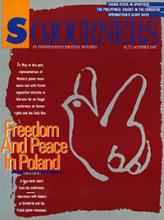Given the increasingly monolithic, corporate nature of our society, it is not easy to find a good bank--one that does not cheat its customers or invest their moneys in crooked business ventures or corrupt foreign governments. So it was with no small feeling of good fortune that we at discovered such a mom-and-pop-type bank just two blocks from our office in northeast Washington, D.C.
Some 20 Sojourners staffers kept their paltry checking accounts at that small bank. We came to know the tellers and account managers by name, and they came to know us, too, even following with chatterbox concern the wedding plans of two Sojourners customers.
So when Citicorp, America's biggest bank and the largest U.S. investor in South Africa's apartheid government, took over our neighborhood bank last year, we felt we had lost more than just a bank. One by one we closed our accounts, talking with tellers and writing letters to bank managers explaining that we could not do business with America's premier corporate supporter of apartheid and an institution with $700 million in outstanding loans in South Africa.
Then in June Citicorp announced it was selling its South African subsidiary. Citicorp, the last U.S. bank with direct operations in that country, thus became the 136th U.S. corporation to withdraw from South Africa or to declare its intention to leave that country since 1984. And since Citicorp's action, the total number of U.S. firms to disinvest their South African operations has risen to more than 150.
But Citicorp, like almost all of the divesting corporations, insisted that its action was not taken in response to anti-apartheid pressure or for political or moral reasons. Citicorp and the other firms claimed they were leaving South Africa for purely economic reasons. But there is no such thing as pure economics, especially in South Africa.
Read the Full Article

